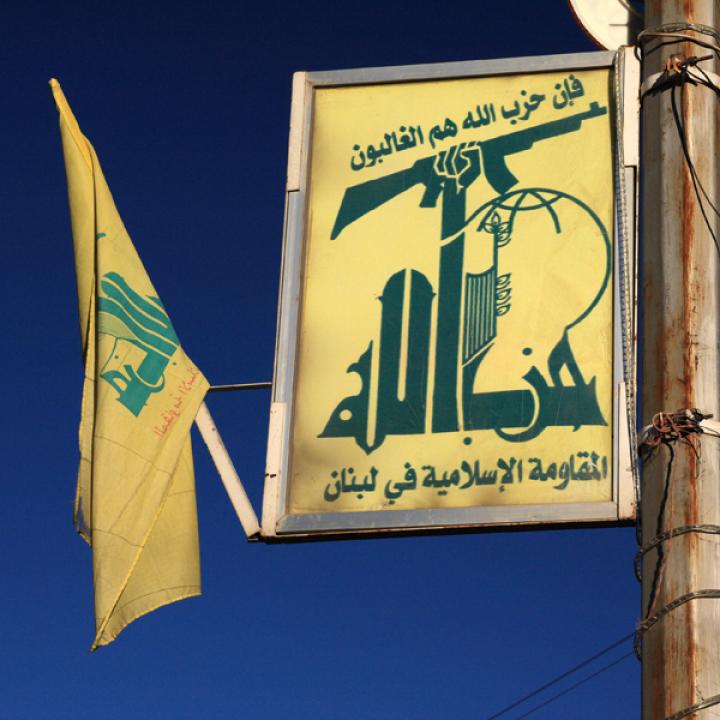
- Policy Analysis
- Articles & Op-Eds
Hezbollah: The Party of Iran, Not Lebanon

A tactical shift by Hezbollah should not be seen as a genuine change in its ideology: it was and remains the party of Iran, not Lebanon.
Hezbollah's standing in Lebanese society has plummeted. By allying with Bashar al-Assad's regime in the Syrian civil war, the group revealed that it prioritizes patronage over patriotism and, as a result, many non-Shiite Lebanese now regard it as a foreign proxy serving Iranian interests. But this is not the first of Hezbollah's missteps in recent years.
Following the 2005 assassination of Prime Minister Rafiq Hariri, the group threw its support behind the Syrian regime, which many Lebanese blamed for Hariri's murder. Although Damascus denied any involvement in the killing, massive protests broke out in Beirut calling on Syria to withdraw its troops from Lebanon. Yet Hezbollah and its allies stood by Assad. What is more, it refuses to cooperate with the Special Tribunal for Lebanon, which is investigating the assassination, or hand over its members who are suspected of being involved. In 2006, Hezbollah unilaterally launched a month-long war against Israel without the consent of the Lebanese government. In 2008, Hezbollah fighters occupied parts of the Lebanese capital after the government discovered its secret surveillance system at the airport in Beirut. So Hezbollah's decision to drag Lebanon into a sectarian war in nearby Syria--which has invited Sunni militants to carry out attacks across the country--is simply yet another strategic miscalculation that has tarnished the image of Lebanon's so-called "Islamic resistance."
But all is not lost for Hezbollah. Ironically, its salvation seems to have inadvertently come from the most unlikely of sources: ISIS. The Islamic State of Iraq and al-Sham has swept across Syria and Iraq, wreaking havoc on religious minorities and leaving the entire region on edge, including Lebanon. Given the fragile state of their country, Lebanese are once again looking for a national savior, and Hezbollah is ready to fill that role.
ISIS's push into the eastern Beqa Valley town of Arsal this past August demonstrated the threat posed by the group. Along with elements of Jabhat al-Nusra, al-Qaeda's Syrian affiliate, ISIS invaded Arsal after Lebanese security forces arrested a Nusra commander who had recently sworn allegiance to the so-called Islamic State. With the help of Sunni clerics, the army was able to restore calm, but dozens of soldiers were killed and captured in the process. Hezbollah, for its part, stayed out of the fight for tactical reasons. But in October, when ISIS and Jabhat al-Nusra elements attempted to infiltrate eastern Lebanon, the group fought back and successfully repulsed the militants on its own, without the help of the army and with fewer casualties.
As a result, for a growing number of Lebanese, Hezbollah seems to be the only barrier between them and ISIS. Sensing the opportunity to reenter mainstream Lebanese society, Hezbollah simultaneously plays up its ability to successfully confront ISIS and Jabhat al-Nusra, while playing on existing fears of support for these groups among the growing Syrian refugee population in Lebanon. Capitalizing on the change in domestic sentiment, Hezbollah has resurrected the Lebanese Resistance Brigades, established in 1988 for non-Shiites who wanted to fight against Israel, to combat ISIS. Reports indicate that Sunnis have even joined the brigades.
Hezbollah has also signaled its reentry into the Lebanese mainstream by attacking Israel. On October 7, Hezbollah detonated a bomb in Shebaa Farms, injuring two soldiers. Aside from occasional attacks against Israel from across the Blue Line, Hezbollah has avoided open confrontation with Israel since the 2006 Lebanon war. But Hezbollah openly claimed responsibility for the recent bombing and even acknowledged its violation of UN Security Council Resolution 1701, which ended the 2006 war. And in doing so, Hezbollah may not have sought to provoke the Israel Defense Forces (IDF), but rather convey a twofold message: it is not spread too thin to fight against Israel, and it has reclaimed its place and legitimacy in Lebanon. While some Lebanese politicians criticized Hezbollah for risking a conflagration with the IDF, the group may be more in tune with the sentiments of the Lebanese street. As the ISIS threat grows, support for Hezbollah will grow too. Considering the dearth of support for ISIS among Lebanese of all sects, it is no surprise that among non-Shiites, Hezbollah is increasingly viewed as the lesser of two evils, if an evil at all, giving it more freedom both domestically and abroad.
Hezbollah is highly adaptable organization and, if it acts strategically, it may once again reemerge as Lebanon's rescuer. But it would be a mistake to think that the Shiite militia has not learned from its experiences over the past 14 years. When the ISIS threat recedes, Hezbollah will likely once again opt for a more conciliatory approach toward Lebanese society in order to maintain popular support. But such a tactical shift should not be seen as a genuine change in its ideology. Hezbollah was and remains the party of Iran, not Lebanon.
David Daoud holds a juris doctorate in international law and has worked in Lebanon and Egypt.
Fikra Forum


